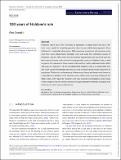100 years of Haldane’s rule
Abstract
Haldane's rule is one of the ‘two rules of speciation’. It states that if one sex is ‘absent, rare or sterile’ in a hybrid population, then that sex will be heterogametic. Since Haldane first made this observation, 100 years have passed and still questions arise over how many independent examples exist and what the underlying causes of Haldane's rule are. This review aims to examine research that has occurred over the last century. It seeks to do so by discussing possible causes of Haldane's rule, as well as gaps in the research of these causes that could be readily addressed today. After 100 years of research, it can be concluded that Haldane's rule is a complicated one, and much current knowledge has been accrued by studying the model organisms of speciation. This has led to the primacy of dominance theory and faster-male theory as explanations for Haldane's rule. However, some of the most interesting findings of the 21st century with regard to Haldane's rule have involved investigating a wider range of taxa emphasizing the need to continue using comparative methods, including ever more taxa as new cases are discovered.
Citation
Cowell , F 2023 , ' 100 years of Haldane’s rule ' , Journal of Evolutionary Biology , vol. 36 , no. 2 , pp. 337-346 . https://doi.org/10.1111/jeb.14112
Publication
Journal of Evolutionary Biology
Status
Peer reviewed
ISSN
1010-061XType
Journal item
Collections
Items in the St Andrews Research Repository are protected by copyright, with all rights reserved, unless otherwise indicated.

